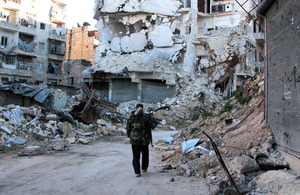Human Rights and Democracy Report 2012 - Saudi Arabia
The year saw a number of localised protests and demonstrations in the Eastern Province, primarily among the Shia community.

Aleppo, Karm al Jabal. This neighborhood is next to Al Bab and has been under siege for 6 months, 4 March 2013. Credit: Basma
Human rights in countries of concern - Saudi Arabia
Key areas of concern to the UK in Saudi Arabia include restrictions on freedom of expression and assembly in the Eastern Province and elsewhere in the country, the continued use of the death penalty (where the number of executions remains close to the 2011 figures), restrictions on freedom of religion or belief, discrimination against women, and a justice system which still falls short of international standards. The year saw a number of localised protests and demonstrations in the Eastern Province, primarily among the Shia community. Protests intensified in the second half of the year and turned violent following the arrest of Shia cleric Nimr al-Nimr in July for remarks about the security forces and members of the Royal Family. More positively, we have seen some modest improvements in women’s rights, including the first ever participation of female Saudi athletes in the Olympics at London 2012. We welcomed the appointment of a new head of the Commission for Virtue and the Prevention of Vice, which led to more open and moderate exercise of its powers. There has also been further reform of the justice system with increased judicial training, better technology and media access to trials. We also expect to see some reforms in the status of migrant workers, with a set of proposals currently being reviewed by the Council of Ministers.
In recognition of our assessment that it will be some time before the abolition of the death penalty is a realistic possibility, we pressed for the application of EU minimum standards for capital punishment. The Saudi Justice Minister agreed to further discussion on execution methods following his meeting with Baroness Warsi in April, and the President of the National Society for Human Rights, Dr Mufleh al-Qahtani, agreed to raise with the Saudi Arabian government the request by the FCO Parliamentary Under-Secretary of State, Alistair Burt, for the cessation of public executions on the grounds that they were not prescribed in the Koran.
We sought to increase our understanding of the cultural sensitivities surrounding women’s rights issues in Saudi Arabia and to support reforms. The British Embassy in Riyadh supported Saudi female participation at the London Olympics to which some conservative sections of Saudi society were opposed.
We also responded to allegations of torture. We promoted the benefits of greater transparency and accountability in the Saudi Arabian justice system. A visit to the UK by the Saudi Justice Minister in April for discussions with ministers, parliamentarians and judges, included a visit to the Old Bailey and Belmarsh Prison to demonstrate the value of an open and transparent justice system.
We pressed, too, for greater religious freedom in Saudi society. Ministers lobbied for greater access for expatriates to public facilities for worship. But while people are allowed to practise their faith in private, it is likely to be some time before Saudi society is ready openly to accept the public practice of other religions within Saudi Arabia.
In 2013, we expect there to be continued progress on rights for women and migrant workers, and continuing reforms to parts of the justice system. We expect localised unrest to persist in the Eastern Province with associated restrictions on freedom of expression and assembly. Human rights defenders and civil society organisations will continue to find it difficult to operate in Saudi Arabia, the death penalty will remain in place and we will probably hear more reports of long detentions without trial and allegations of torture. Child marriage is still likely to occur and the restrictions on freedom of religion and belief will remain. Our objectives will be to support efforts to increase political participation by reinforcing the authorities’ endeavours to give citizens a meaningful stake in the governance of their country, to encourage increased transparency, accountability and effectiveness of Saudi institutions by supporting reforms to the criminal justice system, encouraging the rule of law and reducing corruption and to promote freedom and fairness in Saudi society by pushing for greater equality and work to reduce discrimination on the grounds of gender, nationality, religion and belief.
Further information
Read and comment in English on Human rights in countries of concern - Saudi Arabia
Read and comment on the Human Rights and Democracy Report 2012 in full in English